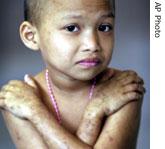VOA慢速英语 2008 0331a
搜索关注在线英语听力室公众号:tingroom,领取免费英语资料大礼包。
(单词翻译)
Development Report - AIDS: The Future of a Vaccine1, and New Warnings for Asia
A study says the number of Asians with H.I.V. could double to 10 million by 2020 unless prevention efforts expand. And scientists meet in the U.S. to discuss the latest setbacks in developing an AIDS vaccine. Transcript2 of radio broadcast:
30 March 2008
This is the VOA Special English Development Report.
A new study says Asia must do more to prevent AIDS, or the number of people infected with H.I.V. could double by two thousand twenty.
 |
| Seven-year-old AIDS patient in Bangkok, Thailand |
Today about five million people in Asia are living with the virus that causes AIDS.
An estimated three hundred thousand people died of H.I.V.-related diseases in Asia last year. At current rates, that number could rise to almost five hundred thousand.
The United Nations program on H.I.V./AIDS requested the study, led by Indian economist3 Chakravarthi Rangarajan.
The report says three main groups are driving the spread of AIDS in Asia. One group is sex workers and the men who use them. Another is injection drug users who share needles. And the third group are men who have unprotected sex with other men.
Researchers estimate that as many as ten million women in Asia sell sex. At least seventy-five million men buy on a regular basis. In many Asian countries, these men, and their female partners, represent the largest group of people living with H.I.V.
The study found that AIDS is the most likely cause of death and lost work days for people in Asia between the ages of fifteen and forty-four.
The report says prevention programs can be effective if governments invest at least thirty cents a year per person.
For more than twenty years, scientists have been trying to develop a vaccine to prevent H.I.V. infection. The latest failures came last September. Researchers halted two studies of an experimental AIDS vaccine from the drug company Merck.
Early results showed that the vaccine not only failed to protect, it appeared to put some people at higher risk of infection.
Last Tuesday, several hundred researchers and activists4 met in Bethesda, Maryland, for a Summit on H.I.V. Vaccine Research and Development. They debated what to do now.
Many of the scientists agreed that experimental vaccines5 should continue to be tested on humans. But many said there should be less dependence6 on human trials.
Anthony Fauci is head of the National Institute of Allergy7 and Infectious Diseases, which called the meeting. He and others said there should be more tests on animals, to add to discoveries from human studies.
There also were calls for a return to more basic science, first identifying and answering major scientific questions. But Doctor Fauci said the search for an AIDS vaccine will not stop.
And that’s the VOA Special English Development Report, written by Jill Moss8.
 收听单词发音
收听单词发音 




